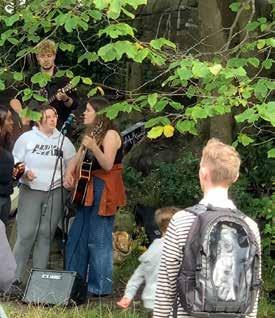
4 minute read
Becoming a charity
from Cash for Culture
Becoming
Becoming a charity a charity
Creative groups come in different shapes, sizes and structures and funders are well aware of this. Some will require you to be a registered charity, while others will be content with your group being constituted and having a bank account (or even be happy with you nominating a larger organisation to receive the funds on your behalf).
If you start to find that not being a registered charity is limiting your fundraising options, then it’s worth considering making the move to become one. The Scottish Council for Voluntary Organisations (SCVO) has a range of helpful resources on its website taking you through the entire process and helping you decide what kind of charity to become (e.g. a social enterprise, a charitable incorporated organisation). They also have templates for writing your constitution. https://scvo.scot/support/setting-up-acharity
OSCR, the Office of the Scottish Charity Regulator, has a number of helpful resources on its website including ‘10 questions to ask yourself if you’re thinking about becoming a charity’. www.oscr.org.uk
Your local ‘Third Sector Interface’ (volunteer centre) can also provide help and support with becoming a charity, or simply deciding what shape your group should take. You can find the office closest to you here: https://tsi.scot
Creative Lives
Download Creative Lives’ free information briefing, ‘Getting Charitable Status’ at www.creative-lives.org/ getting-charitable-status
&Q A
How was it for you?
We speak to Graham Galloway, former Chair of youth music project DD8 Music and Chief Executive of Dementia support hub Kirrie Connections, about his experience of registering as a charity. How long had DD8 Music and Kirrie Connections been going before they took the decision to become a registered charity?
“Each organisation had a very different route to becoming a charity. DD8 Music formed in 2005 as an unincorporated association, and for the first 12 years that suited the scale of things the organisation was doing – and we were able to apply for some small grants to support the work we were carrying out locally.
The biggest driver to becoming a charity was our annual music festival, Bonfest. This festival grew in size significantly, leading up to 2016 which was the first year we held one on a really large scale. We realised at this point that we really needed the additional safeguards that charitable status would bring, and in 2017 the decision was taken to become a Scottish Incorporated Charitable Organisation (SCIO).
Kirrie Connections started in 2015 and was initially a project under another charity, The Kirriemuir & Dean Area Partnership. But what started as a project very quickly became something more substantial, and in 2018 Kirriemuir & Dean Area Partnership decided that Kirrie Connections should also become a SCIO. Kirrie Connections is what’s known as a ‘2-tier’ SCIO, which means it has a wider membership, made up of people who use the charity’s services, local people and other stakeholders, plus a board of trustees which is elected by the membership and is directly accountable to them.”
How did you find the process of registering with the Office of the Scottish Charity Regulator (OSCR)? Did they help guide you through the process?
“Once the decision had been made to become a charity, both organisations found the transition process to be relatively straightforward. There is a lot of great information on the OSCR website on everything from governance structures through to trustee roles and responsibilities. We also received some great advice from other local charities who had already been through the process.
The main support both DD8 Music and Kirrie Connections got was through SENScot Legal, a social enterprise that provided affordable legal services to the third sector in Scotland, which helped both charities draw up constitutions and get registered with OSCR. Unfortunately SENScot wound down at the end of June 2022, but a new social enterprise called Àrachas³, which offers the same service, has now launched and can be found at www.arachas3.co.uk
What responsibilities do you take on when you become a charity? How much time does this take you, as an organisation?
“The main responsibilities are around the annual report and financial reporting back to OSCR. While this is more onerous than the level of reporting an incorporated organisation has to do, it definitely brings benefits in ensuring your organisation has rigorous financial systems in place. Once these become part of your day-today working, they really don’t add a huge amount of extra work and the benefits far outstrip any disadvantages. The level of reporting increases with the amount of income, with additional information required at turnovers of £25,000 and £250,000, and with a full audit being required over £500,000.”
What are the benefits of being a charity and have you found more fundraising opportunities?
“The key benefit is the fact that charitable status does open you up to a much wider pool of funding. Many funders will only offer their grants to charities. Also, once registered with HMRC, you are able to claim Gift Aid on eligible donations, potentially adding 25% to every donation.” (see page 55 for more information on Gift Aid)
If a group is thinking of taking the plunge and becoming a charity, what advice would you give them?
“Don’t be scared! The benefits of becoming a charity vastly outweigh any negatives. You do need to ensure that you have the right trustees on board to take things forward, but once you do, charitable status will open up many more doors. If you do have any concerns I would approach a local charity to ask about their experiences – most small charities will be happy to chat and offer advice.”










